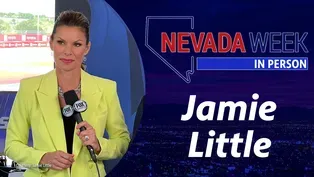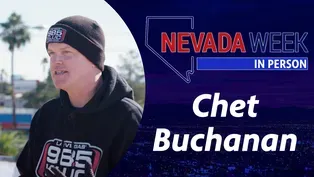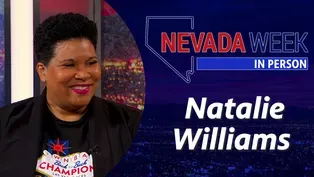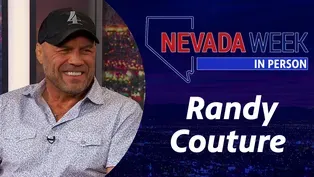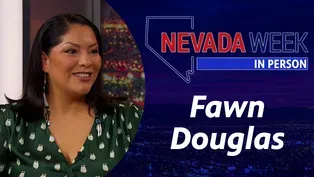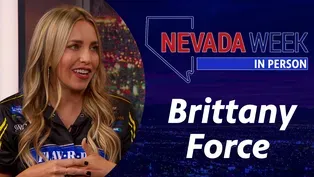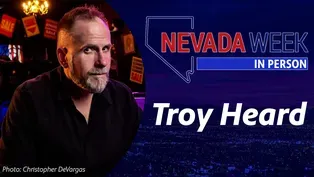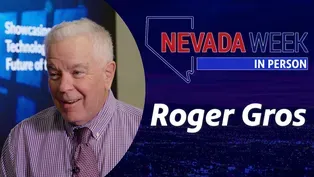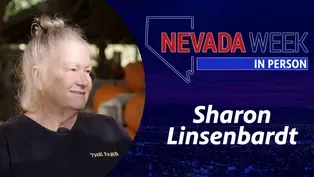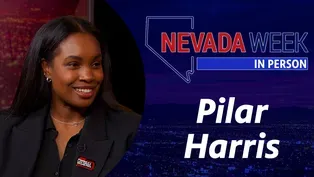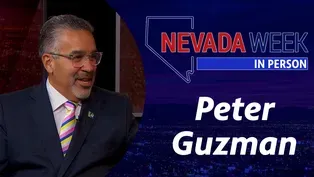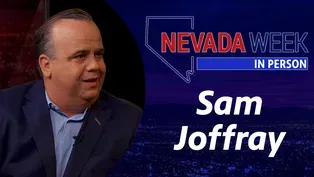
Nevada Week In Person | Sheriff Kevin McMahill
Season 1 Episode 74 | 14mVideo has Closed Captions
One-on-one interview with Sheriff Kevin McMahill.
One-on-one interview with Sheriff Kevin McMahill.
Problems with Closed Captions? Closed Captioning Feedback
Problems with Closed Captions? Closed Captioning Feedback
Nevada Week In Person is a local public television program presented by Vegas PBS

Nevada Week In Person | Sheriff Kevin McMahill
Season 1 Episode 74 | 14mVideo has Closed Captions
One-on-one interview with Sheriff Kevin McMahill.
Problems with Closed Captions? Closed Captioning Feedback
How to Watch Nevada Week In Person
Nevada Week In Person is available to stream on pbs.org and the free PBS App, available on iPhone, Apple TV, Android TV, Android smartphones, Amazon Fire TV, Amazon Fire Tablet, Roku, Samsung Smart TV, and Vizio.
Providing Support for PBS.org
Learn Moreabout PBS online sponsorshipMore from This Collection
Nevada Week In Person | Jamie Little
Video has Closed Captions
One-on-one interview with Jamie Little, NASCAR Broadcaster (14m)
Nevada Week In Person | Chet Buchanan
Video has Closed Captions
One-on-one interview with Chet Buchanan,Host & Creator, 98.5 KLUC’s The Chet Buchanan Show (14m)
Nevada Week In Person | Natalie Williams
Video has Closed Captions
One-on-one interview with Natalie Williams, General Manager, Las Vegas Aces (14m)
Nevada Week In Person | Randy Couture
Video has Closed Captions
One-on-one interview with Randy Couture, UFC Hall of Famer & U.S. Army Veteran (14m)
Nevada Week In Person | Fawn Douglas
Video has Closed Captions
One-on-one interview with Fawn Douglas, Artist and Activist, Nuwu Art (14m)
Nevada Week In Person | Brittany Force
Video has Closed Captions
One-on-one interview with Brittany Force, World Champion Drag Racer (14m)
Nevada Week In Person | Troy Heard
Video has Closed Captions
One-on-one interview with Troy Heard, Artistic Director, Majestic Repertory Theatre (14m)
Nevada Week In Person | Roger Gros
Video has Closed Captions
One-on-one interview with Roger Gros, Publisher, Global Gaming Business Magazine (14m)
Video has Closed Captions
One-on-one interview with Sharon Linsenbardt, Owner, Las Vegas Farm and Barn Buddies Rescu (14m)
Nevada Week In Person | Pilar Harris
Video has Closed Captions
One-on-one interview with Pilar Harris (14m)
Nevada Week In Person | Peter Guzman
Video has Closed Captions
One-on-one interview with Latin Chamber of Commerce Nevada President & CEO Peter Guzman (14m)
Nevada Week In Person | Sam Joffray
Video has Closed Captions
One-on-one interview with Sam Joffray, President & CEO, Las Vegas Super Bowl LVII Host Com (14m)
Providing Support for PBS.org
Learn Moreabout PBS online sponsorshipHe's Metro's top cop and aims to inject humanity into policing.
Clark County Sheriff Kevin McMahill is our guest this week on Nevada Week In Person.
♪♪♪ Support for Nevada Week In Person is provided by Senator William H. Hernstadt.
Welcome to Nevada Week In Person.
I'm Amber Renee Dixon.
A 30-year veteran of the Las Vegas Metropolitan Police Department, he was sworn in as the eighth Sheriff in department history at the start of this year.
Clark County Sheriff Kevin McMahill, thank you for joining Nevada Week In Person.
(Kevin McMahill) You're welcome.
Thanks for having me.
-Thank you for bringing in your son.
I found that interesting.
I asked if you brought him because it's summer break?
Your response was?
-He wants to know what I'm doing and how I'm doing it.
And it's a day that I'm not stuck in meetings.
I get to see some cool stuff over here, and so brought him along with me.
-One of five children?
-One of five, yes.
And two grandchildren at this point.
I have two grandsons as well.
-Congratulations.
How do you think that impacts you in policing, having such a big family?
-Oh, that's a great question.
How does it impact me?
I would say that it's really just sort of the same thing as when I look at this community as a whole.
What caused me to run for sheriff after having retired is that, you know, I policed this community for 30 years.
I love this community.
It means everything to me.
And being able to provide a safe environment to our citizens and my family members and your family members and you, it sounds corny, but it really matters to me.
And I know how good American police can be.
And I know that without the right leadership, I know how bad they can be.
And so I chose to run to make Metro even better than it really is.
-Gosh, how big of a fear is that for you of the bad policing aspect that can happen?
-I'm not fearful of it really here.
We've really built a strong culture over the years.
We don't get everything right.
I certainly don't want to sit here and tell you that we're without our problems.
But we tend not to make the same mistakes twice.
And, you know, leadership is really a critical component of driving American policing to where the people that we police consent to how it is that we police them.
And so we're making a lot of headway.
This is where we talked a little bit previously about injecting humanity, right?
When you talk about injecting humanity as a philosophy of community policing, I think you, when you look around the country, police chiefs and police departments have lost what it means to truly community police.
So I wanted to simplify it.
I said that in all of our interactions, we will inject humanity.
And people ask, What does that really mean?
Let me give you the example of George Floyd in Minneapolis.
Kneeling on the neck of a man for 9 1/2 minutes is not acceptable in American policing or any policing anywhere.
And he ends up dead, and then riots ensue across this great country of ours.
And Shay Mikalonis gets shot during one of the riots, and now one of my police officers is paralyzed for the rest of his life.
He will never be the same, nor will his family, because of the actions of the Minneapolis Police Department.
But if we would have had one instance of one of those police officers injecting humanity to say, Knock it off, that's enough, we wouldn't be where we're at today with all of those things.
So it's really a relatively simple concept to recognize the humanity in one another first and foremost and then treat one another in that manner.
And that's exactly where we're going with the Metropolitan Police Department.
-You're also applying that philosophy to your own officers.
-Yes, I am.
-At your inauguration speech, you talked about implementing a wellness bureau.
What is that, and what's its status?
-This has been a really big challenge for me because most police departments-- In President Obama's 21st century policing, that was one of the pillars, which is wellness.
What most agencies have done over the years is that they've taken employee assistance programs, dressed it up, and called it a wellness program.
And that's not really what wellness is, because you have to understand we have singular instances of trauma.
Like you can understand what it was that those of us who worked at One October felt and saw and heard and smell.
But we didn't ever really recognize the effects of cumulative trauma on our cops.
Hundreds and hundreds of homicides in my career that had been out on rapes, robberies, seeing victims at their worst, humanity at its worst, it starts to take a toll.
And so I developed this wellness bureau, now with the help of outside experts because what I realized in a short period of time is we don't have the capacity to build true wellness, because there's people out there-- mental health professionals, licensed clinical social workers --that know how to do this.
And so I've hired them now, and they're building this for me.
And I've intentionally taken it slow because I have to continue to maintain the trust of the men and women of my organization or they'll never take advantage of it.
And so the focus is on heart, mind, body, and soul.
But the beauty of this also is that it's really caught the attention of all first responders.
So moving from, from as the sheriff only focusing in on Las Vegas Metropolitan Police Department, we've now partnered with all of the fire departments, all of the police departments, EMS, and a number of others to figure out how we can build the Southern Nevada First Responder Resiliency Center.
And that is going to be a game changer.
The point is, is if we take care of our first responders in a way we never have, they're going to take care of this community in a way they never have.
-So it's evolved into something much bigger than you originally planned?
-It is.
It's actually become a beast, and so I'm working very hard on it.
There's not a day goes by that I'm not focused in on what that wellness piece is.
-Is there a timeline on it?
-It's up and running.
You know, the thing about this is, is that a lot of these things you can't, you can't publicize how you've succeeded, because you might have an officer in crisis, and I can't go out and ruin their career because they were in crisis.
Or whether it's financial or domestic or any of the challenges, because we are human beings.
I know sometimes people forget that, but we have the same problems everybody else does.
And so how do we take care of them?
That piece of it is really together now, but not to where I want it to be when I talk about it from a regional perspective.
And we continue to meet and make progress on that.
So I would say this time next year, I'd have a really great update for you on that.
-Okay, we're gonna have you back on to talk about it.
-Great.
-You were undersheriff at the time of One October.
What toll did it take on you?
-You know, that's actually part of what prompted this wellness bureau was that I didn't have time to process One October.
I'll never forget the image of all of those victims still being out there on the field and their phones going off and lighting up and the impacts those families have.
And you know, my wife is on the, on the committee to select the memorial and all of that stuff after she retired from Metro.
-So you were out there the day-- -I was at the command post that night within about 10 minutes after the shooting started.
-And when you talk about cell phones ringing, these were in people's pockets who had passed away.
-Yeah, the victims still lying on the field.
-People trying to get ahold of them.
-Their families were incessantly trying to get ahold of them.
And you know, what it did, though, was it made me realize that, you know, we for too long in law enforcement-- really in all first responders, but cops in particular-- was that law enforcement leaders never recognized the impact it took on our men and women.
So after I finally admitted that it had a tremendous impact on me, I realized that when I came back for sheriff, I had a responsibility to sort of change the narrative around that it's okay to not be okay, to seek help, and that mental health counseling and all of these kinds of things --family counseling, marriage counseling-- they're not things to be embarrassed by.
They're things to be celebrated and to continue to help us be grounded.
You know, we have high divorce rates, high suicide rates, high alcoholism, high all the things you don't want to be high in.
And I'm committed as the sheriff while I'm here to do something about that.
-On a little bit of a different topic, there was debate around whether One October was considered an act of terrorism.
Now, according to your campaign website, you are a graduate of the FBI's Leadership and Counterterrorism program.
Do you consider One October an act of terrorism?
-So I think what happens is people get mired into the true definition of terrorism.
And part of the reason for that is it triggers federal response.
And so there's political ideation and affiliation and attempt to change governments and all of that thing in the official definitions.
I personally look at it like this, very simply as, did it cause terror?
And I will tell you that this town was terrified.
Our police and fire and EMS were terrified.
Those 22,000 people that were in that box on that field were terrified.
And so when I look at what terror is, I look at what people feel.
And that also should be about how it is that we adjust our responses to these kinds of things, because we see mass shootings all across the country.
And, you know, there's not, there's not a lot of people identifying that as terrorism.
And I think you need to sort of change the dynamic, because when you do identify something as terrorism, it brings a lot of other resources to bear.
And I think if we start to treat these things like terroristic incidents, that I believe that they are, we can start to make some headway on some of this.
This mental health, addiction, and homelessness that you've heard me talk about that we use, the only, the only people doing anything about that right now really is the police and fire department.
Then the answer is put them in jail.
And by the way, incarceration doesn't fix mental health, addiction, or homelessness.
So we have a responsibility as elected officials to do something.
And we're starting to make a lot of headway on that.
But once we really make a difference in mental health, we'll start to see some of those shootings go down as well.
-You told Fox5 in March that you were bringing in counterterrorism officials to Las Vegas to prepare for the Super Bowl and Formula One.
Was that the conference that was in May, the International Counterterrorism Conference?
-That was the conference I was talking about, yes.
We had an unbelievably successful conference.
About 635 individuals came in from all around the world.
-Media was not allowed.
-No.
And part of the reason for that is not because it's secrecy, but it's because of the attendees that work in a lot of places that they can't be on television or they can't be recognized.
So to continue to gather the kinds of people that are the frontline individuals that are fighting against terrorism all around the world, we just exclude media from that part of the conference.
And so I know it's tough because I want to celebrate it in a way that I just can't because of the attendees of the conference.
-Well, how big of a threat is terrorism to Las Vegas right now?
-Well, you know, everybody tends to focus on domestic terrorism now, right?
Part of the reason for that is, is that you have individuals that have their grievances.
And it used to be you might have somebody in the Arian Brotherhood who was affiliated with that way of thinking, so you could kind of figure that they were going to move towards action based on these types of grievances.
Now it's all over the board with mental health.
You might have an Arian Brother with a street gang that's mixed that you have no idea how they're even affiliated in one way, shape, or form.
But they'll-- And the problem is, is they move very quickly to action.
So it used to be that there was plotting and planning, and these were the opportunities for us to prevent the act that was coming.
But now with the advent of these sort of manifestos that are released oftentimes from these various different shooters and the grievances that people have, you may be aggrieved all of a sudden, have the ability to get a weapon, and go conduct a mass shooting all within a matter of hours.
And so there's a lot of focusing on domestic terrorism today, and rightfully so.
But I will tell you that that international threat still remains.
Our exit from Afghanistan, I don't care what political persuasion you come from, simply led to a rise in Al Qaeda and ISIS.
We see the Khorasan province terrorist activity rapidly, rapidly expanding.
And if you look at where Al Qaeda is really focused today, it's in Africa.
-We are running out of time.
-I'm sorry.
-No, don't apologize, because everything you're talking about is fascinating.
I would be remiss if I did not ask about some bodycam video recently of a light streaking across the sky.
8 News Now then reported that there was a 911 call in which your officers responded to people saying they saw alien-like figures in their backyard.
-Yeah.
-What can you tell us about that?
-All that's true.
That all happened.
We captured it on bodycam.
It looked to me like a bright light coming across the sky, like potentially a meteorite or something of that sort.
Very shortly thereafter, we had citizens calling in 911 and saying they saw, I think it said 7-, 8-, 9-, or 10-foot aliens in the backyard.
I really believe they believed what they saw at the time.
I know our officers were dispatched out there.
And I know on even watching their bodycam, they were kind of creeped out about how much those individuals really believed that it happened.
I mean, some of the aftermath of that-- there was some cameras that were put up because there were some-- -Metro put cameras on their house.
-Yeah, because we were trying to protect the house and individuals that were coming by.
I've heard the stories of, you know, blacked-out sedans and federal government.
If that's true, I haven't been notified of it by any federal agencies, and I've never seen it or had it reported to me by my individuals.
I don't know what it was, quite frankly.
The saucer shape that's in the backyard, it's an interesting-- it would seem very small for a 7-, 8-, 9-, 10-foot person to be able to get into an unidentified flying object.
But listen, the bottom line is I don't know what happened.
-Do you believe in aliens?
-I do.
I do.
I think the universe is too big for us not to have other life.
-Sheriff Kevin McMahill, thank you so much for your time and joining Nevada Week In Person.
For more interviews like this, go to vegaspbs.org/nevadaweek.
♪♪♪
Support for PBS provided by:
Nevada Week In Person is a local public television program presented by Vegas PBS
